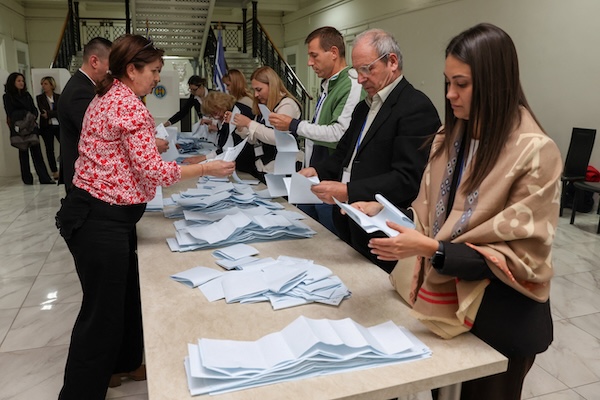 Members of an electoral commission count ballots after polling stations closed in Moldova's parliamentary elections in Chisinau, Moldova, Sunday 28 September 2025;
Credit: Reuters/Stringer
Members of an electoral commission count ballots after polling stations closed in Moldova's parliamentary elections in Chisinau, Moldova, Sunday 28 September 2025;
Credit: Reuters/Stringer
CHISINAU (Reuters) - Moldova's pro-European Union ruling party won a resounding victory over its Russian-leaning rival in a key parliamentary election, results showed on Monday 29 September 2025, an endorsement of Moldova's bid to join the bloc and break free from Moscow's orbit.
The strong performance on Sunday 28 September by President Maia Sandu's Party of Action and Solidarity against the Patriotic Bloc will be a relief for the government and its European partners who had accused Moscow of seeking to influence the outcome.
Polls leading up to the election put PAS and Patriotic Bloc neck-and-neck with neither likely to get close to a majority. The near-final tally by Moldova's electoral commission allows the government to push for its goal of EU membership by 2030.
Accusations of Russian meddling in the vote
It also spares Moldova the political horse trading that had threatened to invite more instability following what officials described as a Russian campaign to disrupt the vote and derail Chisinau's course toward Europe.
Moscow has denied meddling in Moldova.
With nearly all votes counted, PAS won 50.1% versus 24.2% for the Patriotic Bloc, which had sought to steer Moldova closer to Moscow.
The buildup to an election that PAS leaders called the most consequential since Moldova's independence from the Soviet Union in 1991 was marred by accusations of foul play by both sides up to and on the day of polling.
Sandu's government warned Moldovans that Russia had attempted to sway the vote through widespread disinformation and vote-buying.
Stanislav Secrieru, Sandu's national security adviser, said election infrastructure and government websites had come under cyber-attack, and that fake bomb threats were called in to polling stations in Moldova and abroad.
On Sunday, Patriotic Bloc co-leader Igor Dodon, a former Moldovan president, called for protests the next day in front of parliament, claiming that Sandu was planning to annul the vote. He did not provide evidence.
Authorities, which had also warned of Russian-backed attempts to stir unrest after the vote, will watch closely to see if Dodon follows through on the threat, and what crowds he can command if he does.
Pulled east and west
Moldova - with a population of 2.4 million people that has been buffeted by the war in neighbouring Ukraine, alleged Russian interference and energy shortages - has long vacillated between Russia and Europe.
The Patriotic Bloc and other opposition groups had sought to tap into voter anger over economic pain and the slow pace of reforms - grievances worsened by what officials say has been widespread disinformation.
Inflation remains stubbornly high at around 7%, while Moldovans also shoulder higher costs for imported energy.
But the electoral performance by PAS suggests its platform of European integration and breaking with Russia still resonates among wide swathes of voters.








